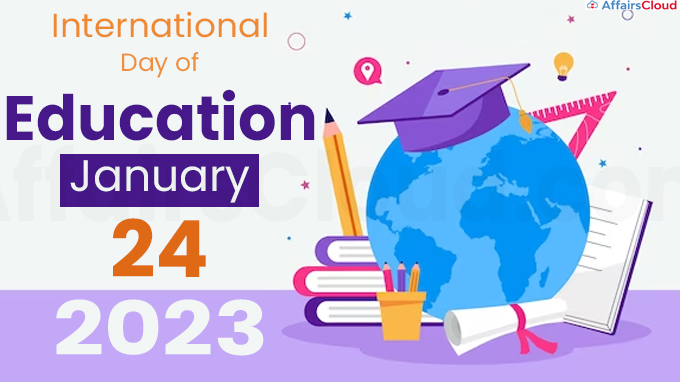 United Nations (UN)’s International Day of Education (IDE) is annually observed across the globe on January 24 to celebrate the role of education in peace and development.
United Nations (UN)’s International Day of Education (IDE) is annually observed across the globe on January 24 to celebrate the role of education in peace and development.
- 24th January 2023 marks the 5th observation of International Day of Education.
The theme of International Day of Education 2023 is “to invest in people, prioritize education”.
- The United Nations Educational, Scientific, and Cultural Organization (UNESCO), the United Nations agency for education, facilitates the annual observance of the Day in close collaboration with main education actors.
Background:
i. The United Nations General Assembly (UNGA) adopted the resolution A/RES/73/25 on 3rd December 2018 and proclaimed January 24 of every year observed as International Day of Education.
ii. Nigeria and 58 other Member States co-authored the resolution.
iii. The 1st ever International Day of Education was observed on 24th January 2019.
IDE 2023 significance:
i. The UNESCO dedicates the 5th edition of International Day of Education to all the girls and women in Afghanistan, who have been deprived of their right to education.
- Currently, 2.5 million (80%) Afghan school-aged girls and young women are out of school, with 1.2 million being denied access to secondary schools and universities following the decision of the de facto authorities.
Event:
i. UNESCO is hosting an event at the UN in New York, with the contribution of the UN Secretary-General, the President of the UNGA, and UNESCO’s Director-General.
ii. The 1st-panel discussion will focus on the education of Afghan girls and women.
Key Points:
i. According to UNESCO, 244 million children and youth are out of school, and 771 million adults are illiterate.
ii. Building on the global momentum generated by the UN Transforming Education Summit in September 2022, IDE 2023 will call for maintaining strong political mobilization around education and chart the path to putting commitments and global initiatives into action.
iii. To accelerate progress toward all of the Sustainable Development Goals in the face of a global recession, growing inequalities, and the climate crisis, education must be prioritised.
SDG 4:
Sustainable Development Goal (SDG) 4 (quality of education) aims to endure inclusive and equitable quality education and promote lifelong learning opportunities for all by 2030.
- 2023 marks the midpoint since the UN adopted the 2030 Agenda for People, Planet, and Prosperity, which includes a set of 17 interconnected goals that will be reviewed at the SDG Summit in September on the theme of investing in people.
UNESCO Report:
On International Day of Education 2023, UNESCO published a global report, the 2023 SDG4 Scorecard, which provides the 1st benchmark publication by UNESCO’s Global Education Monitoring Report and Institute for Statistics, highlighting how quickly countries are achieving their national benchmarks for SDG 4.
- So far, 3 of the 4 countries have submitted benchmarks to be achieved by 2030 for at least one of the key SDG4 indicators.
UNESCO’s Support of Afghan Students:
i. Over 20 million Afghans were reached through a UNESCO advocacy campaign to raise public awareness of the right to education for youth and adults, particularly adolescent girls and women.
ii. UNESCO has also collaborated with non-governmental organizations (NGOs) to launch a community-based literacy campaign targeting the ground to launch a community-based literacy campaign that targeted 25,000 young people and adults in rural areas, mainly adolescent girls over the age of 15 and women.
iii. With the support of the International community, including UNESCO, Afghanistan saw a huge increase in enrolment at all education levels from 2001 to 2021.
About the United Nations Educational, Scientific, and Cultural Organization (UNESCO):
Director-General- Audrey Azoulay
Headquarters- Paris, France
Establishment- 1945 (came into force in 1946)
Members- 193 Members and 11 Associate Members.




